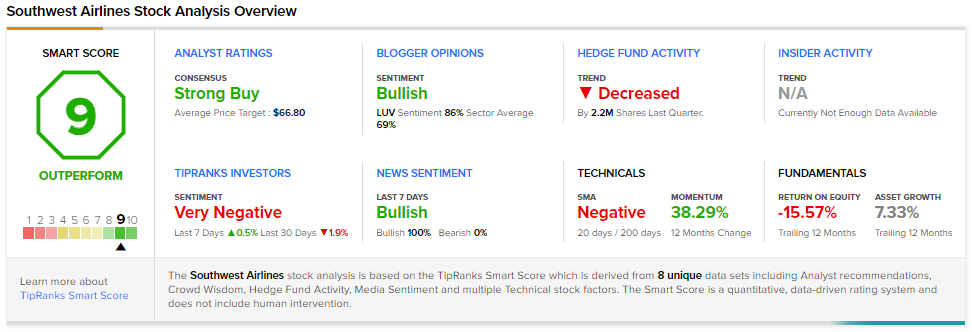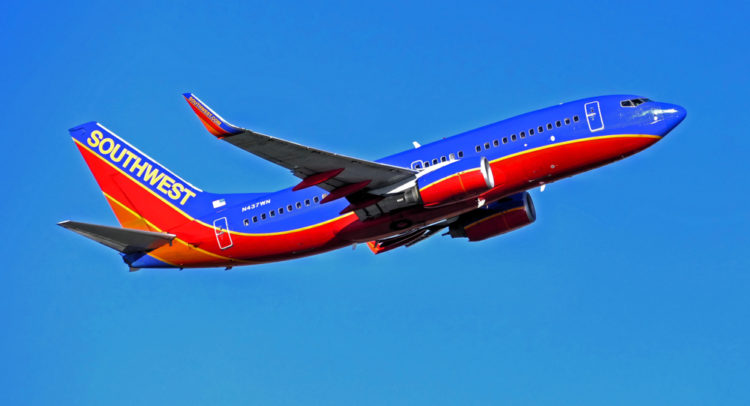Shares of Southwest Airlines (LUV) dropped 3.6% in Monday’s pre-market trading session after the airline canceled more than 1,800 flights over the weekend, according to an article on CNBC.
The company attributed a host of factors to the cancellations including bad weather, air traffic control issues, and a shortage of staff. (See Southwest stock charts on TipRanks)
Southwest Airlines apologized to disappointed customers whose travel plans were disrupted. According to flight-tracking site FlightAware, 808 cancellations on Saturday were followed by another 1,019 canceled flights (28% of its operation) on Sunday.
Destinations hardest hit by the cancellations included Denver, Baltimore, Dallas Love Field, and Chicago Midway.
There were fewer cancellations by other airlines in the region. American Airlines, operating a large hub in Miami, canceled 66 flights, or 2% of its schedule on Saturday, and Florida-based Spirit Airlines canceled 32 flights, 4% of its operation.
Unlike big airlines like Delta and American, Southwest does not have interline agreements that reroute or rebook travelers on other carriers. This could be one of the reasons for the disparity.
The Federal Aviation Administration (FAA) stated that on Friday afternoon there were a “few hours” of flight delays due to turbulent weather and staffing issues at Jacksonville Air Route Traffic Control Center, which controls airspace in Alabama, Georgia, Florida, North Carolina, and South Carolina.
However, the FAA added, “No FAA air traffic staffing shortages have been reported since Friday… Some airlines continue to experience scheduling challenges due to aircraft and crews being out of place.”
Alan Kasher, EVP of daily flight operations told CNBC, “Although we were staffed for the weekend, we could not anticipate the significant disruption that was created from unexpected ATC issues and bad weather across our Florida stations.”
He added that some crew members didn’t have hotel rooms and disruptions worsened as flight crews hit contractual and federal working limits.
Will Challenges Continue in the Coming Months?
Notably, Southwest, like many other airlines, faced similar cancellations and delays over the summer as they couldn’t meet the unexpected upsurge in demand due to a shortage of staff. As a result, Southwest trimmed its schedule to avoid further disruptions.
When the COVID-19 pandemic peaked, most airlines encouraged thousands of their workers to take leave or buyouts, leading to staff shortages when demand returned.
Last month, incoming CEO Bob Jordan told CNBC that the airline may cut flights over the spring break season if it continues to face staff shortages and fails to hire new employees in the difficult labor market.
According to aviation consulting firm Cirium, Southwest had 3,614 flights scheduled to fly on Sunday, the highest since April 2020 but 8% lower than the corresponding pre-pandemic period in 2019.
Goldman Sachs analyst Catherine O’Brien recently increased the price target on Southwest from $65 to $68 (26.1% upside potential) and maintained a Buy rating.
Overall, the stock has a Strong Buy consensus based on 15 Buys and 1 Hold. The average Southwest Airlines price target of $66.80 implies nearly 28% upside potential. Shares have gained 38% over the past year.
According to TipRanks’ Smart Score rating system, Southwest Airlines scores a 9 out of 10, suggesting that the stock is likely to outperform market averages.

Related News:
eFFECTOR Therapeutics Presents Positive Data For Zotatifin; Shares Surge 27%
Molina Healthcare to Snap Up AgeWell Assets for $100M
Oracle Collaborates with TIM and Noovle to Offer Multicloud Services in Italy
















